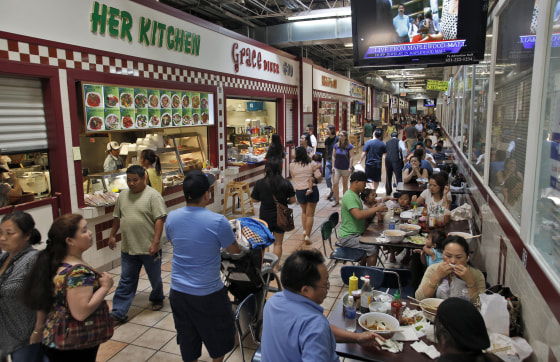Laotian and Hmong refugees are preparing to face a possible increase in deportations, in part because the U.S. government is funding a reintegration program to help Laos accept nationals with final orders of removal.
Asian American advocacy groups in a joint statement last week announced the news of the funding for the program, which the Department of State confirmed in an email.
The development is troubling for Laotians and Hmong with final orders of removal because it creates infrastructure for them to successfully reintegrate into Laotian society, Katrina Dizon Mariategue, director of national policy at the civil rights nonprofit Southeast Asia Resource Action Center, said. "And since a program like this would likely be focused on things like language training, we are fearful that this makes refugees who have not lived in Laos for a long time more susceptible to targeting,” she added.
Lao, Hmong and other Laotian ethnic groups fled the Southeast Asian country after a nine-year bombing campaign by the U.S. during a Laotian Civil War in the Vietnam era that ended in 1973. The U.S. dropped 2 million bombs and artillery in the country, carried out by the CIA. The bombings were part of a conflict called the Secret War and made Laos the most heavily bombed nation per capita in history.
Many of those refugees resettled in the United States, which is home to about 186,000 foreign-born Laotians, according to the 2017 American Community Survey.
“We know many of our elders supported the U.S. as allies, and as a result, we feel really strongly that the U.S. government does have a responsibility to them, and it’s further reason why they should not be deporting them at this time,” Mariategue said.
She noted that the funding of a reintegration program is not absolute confirmation that an increase in deportations will occur. But she said the establishment of a reintegration program in Cambodia, which helps Cambodian deportees from the U.S. adapt to life there, has yielded more of a willingness from foreign governments to accept more removals.
Laotians and Hmong were also met last week with news from advocacy groups and Rep. Betty McCollum, D-Minn., whose state is home to a significant Laotian and Hmong population, that the Trump administration is negotiating with the Laos government to allow for deportations.
The State Department did not address whether or not the Trump administration is negotiating a repatriation agreement with Laos. However, a spokesperson said that the U.S. and Laos governments are in constant dialogue regarding that country's nationals who are subject to final orders of removal.
“Any deportation of Hmong and Lao refugees residing in the U.S. to Laos will tear families apart while putting those individuals at risk in a country that has never been their home,” McCollum wrote in a letter addressed to Secretary of State Mike Pompeo.
According to an Immigration and Customs Enforcement spokeswoman, there are 4,716 nondetained Lao nationals with a final order of removal in the U.S., 4,086 of whom have criminal convictions.
As of Feb. 1, there were 38 Lao nationals in ICE custody with a final order of removal, all with criminal convictions. Eight have been deported.
Over the last six fiscal years, a total of 24 Lao nationals have been deported, according to ICE data. Deportations to Laos have been low historically in part because there is no repatriation agreement between Laos and the United States, Mariategue said. But she said Asian American advocacy groups have been preparing for the targeting of Lao nationals since the Trump administration took office.
It's unknown when or how frequently roundups and deportations will occur, but SEARAC plans to work with members of Congress to obtain that information from the State Department and the Department of Homeland Security, Mariategue said.
The Southeast Asian American community has seen a spike in deportations and immigration detentions under the Trump administration, which issued visa sanctions on Cambodia and Laos for refusing to accept deported citizens.
More than 16,000 Southeast Asian Americans have received orders of removal since 1998 as a result of the 1996 Illegal Immigration Reform and Immigrant Responsibility Act, which expanded the definition of what types of crimes could result in detention and deportation. The law also allowed for that broader definition to be applied retroactively. Sixty-eight to 87 percent of those orders are based on old criminal records.
KaYing Yang, director of programs and partnerships at the Coalition of Asian American Leaders, a Minnesota-based nonprofit that alerted McCollum's office about funding for the reintegration program in Laos, noted that this development also affects smaller but important ethnic populations from Laos, including Mien, Khmu, Lahu, Thai Dam and Tai Lue.
